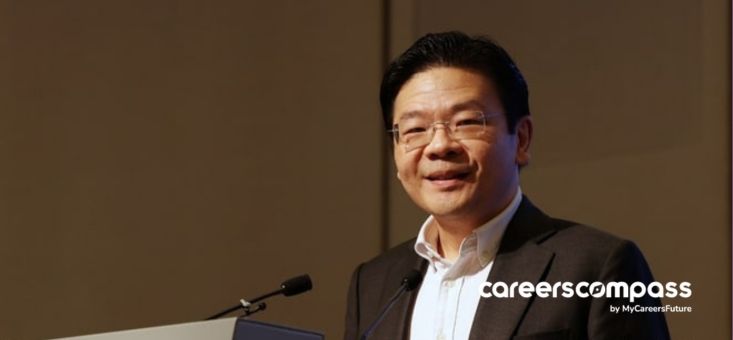Singapore has made a good start with SkillsFuture to encourage lifelong learning, with over 660,000 people benefiting from programmes supported by the scheme last year.
However, with the nature of career disruption, especially for mature and mid-career workers, the challenge for the Singapore government is making the upskilling process easier and fuss-free, especially those who juggle family responsibilities such as caring for aged parents and children.
Speaking at the annual Singapore Economic Policy Forum 2022 recently, Singapore’s Deputy Prime Minister (DPM) Lawrence Wong, who is also the country’s Finance Minister, revealed plans to upgrade the SkillsFuture ecosystem, and the broader strategy to improve the nation’s upskilling model.
As early as 2014, the Singapore government kickstarted SkillsFuture with the aim of retraining Singapore’s workforce. It provided credits for those 25 and above to study over 24,000 courses ranging from digital technology to business management.
Partnerships have also been formed with Singapore-based companies to develop skill sets that match specific job requirements that they and their industries need.
Companies such as PayPal, Microsoft, Siemens and several other multi-national companies (MNCs) partnered on these public-private workforce retraining programmes, with participants benefitting from the resulting synergies.
Short bouts of upskilling “no enough”
DPM Wong said: “For some, short bouts of upskilling from time to time will be enough to top up our skills.
“But frankly, just going for sporadic, half-day courses cannot possibly be enough.”
“At best you get a taster of what to learn, but it surely is not enough to build deep skills. In fact, for all of us, such short courses are insufficient, especially when the economic environment is undergoing such dramatic change and transformation.”
He believes all Singaporean workers will need more extensive efforts to upgrade our skills and stay relevant amidst changing industry needs, or even to pivot to new areas where there are more opportunities.
“The bottom-line is that we will need to make it possible for workers to invest their time in more meaningful and substantial training, be it a few days, a few weeks, or even longer.”
He revealed that Singapore has looked at how other countries have adopted various upskilling models, but they can be hit and miss.
DPM Wong shared: “(There are) some good practices in certain industries, but no country has a comprehensive, nationwide system of adult education and training that achieves all that I’ve just described.”
Making it easier for “upskillers” to juggle family commitments and career needs
To improve our skills upgrading system, there needs to be close collaboration between stakeholders such as training providers, employers, workers and unions.
DPM Wong acknowledged the various concerns from all parties, saying: “For mature and mid-career workers in their 40s and 50s, they are more likely to have heavier obligations taking care of both parents and children at the same time, which make it difficult for them to take time away from work for extended periods.
“We must develop a system which can cater to their needs and help them continue to provide the best for their families.”
Workers with families who undergo training for a few weeks or even a few months to gain the skills necessary to transition into a new role or industry, will naturally be concerned about their incomes.
DPM Wong mulled on the considerations on how to better support them while local workers pursue training full-time: “Can we give employees peace of mind, and time off from work to focus on upgrading?
“Some firms here already have exemplary training leave policies, especially the global companies who understand well the value of human capital.
“But we should see if this can be broadened across the entire economy, while taking into consideration of the needs of businesses.”
Training and courses need to be effective and useful
He also shared how important it is for courses to be useful to Singaporean workers and employers, so that their training is more responsive to changing industry needs, given Singapore’s dynamic employment environment.
“We have to provide more information and guidance to workers, so that they can take charge of their careers and have a better sense of their longer-term career progression goals and pursue purposeful reskilling and upgrading.
“We want them to be assured that the training they undertake is of high quality and will lead to skills that are in-demand by employers and will also lead to better careers for themselves”, DPM Wong said.
Read More: Upskilling and Reskilling – Know the Difference and Why They’re Important for Career Resilience
Singaporean workers aren’t alone in their upskilling journey
DPM Wong shared his trust that an improved SkillsFuture would serve Singapore workers well, saying: “If there is one country in the world that can do this well, it is Singapore.
“Working together, I am confident we can build a better SkillsFuture system that will enable all Singaporeans to develop and grow and bring out the best in them.
“A more effective and comprehensive SkillsFuture system will also provide assurance to Singaporeans at the workplace.”
He concluded: “All of this put together will be a key part of our refreshed compact with all Singaporeans – that we will stay open as a vibrant hub for the world, at the same time, Singaporeans can be assured that they will never walk alone as they journey through their careers.
“We will walk this journey together with all Singaporeans. To invest in you, and help you excel and succeed. To equip, empower and assure you throughout the way!”
Main Image Credit: MCI
![]()















